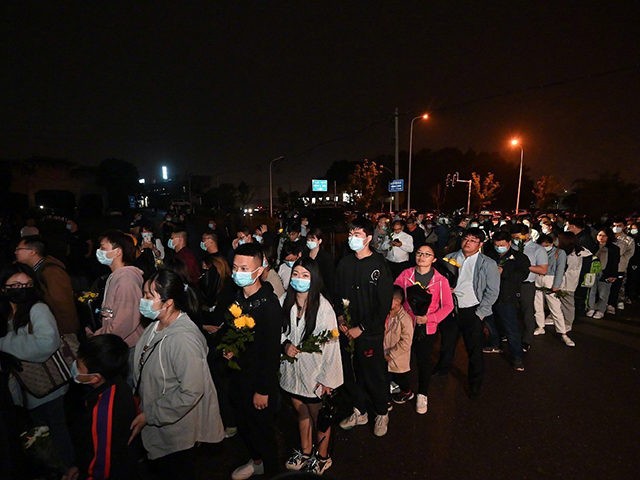A tightly packed crowd of over 100,000 people visited a funeral home to honor late scientist Yuan Longping on Sunday, China’s state-run Global Times newspaper claimed, following his death at 91.
The Chinese Communist Party credits Yuan with the invention of “hybrid rice,” genetically altered varieties of the grain that grow faster and more abundantly, helping shepherd China out of the mass starvation of the Mao Zedong era. Under the communist leaders’ Great Leap Forward and Cultural Revolution campaigns, historians estimate that as many as 45 million died, many of them of starvation.
The Global Times — along with other Chinese government propaganda outlets like China Daily and the People’s Daily — has published extensive coverage of memorial services for Yuan since his death on Saturday, featuring photo essays showing large groups of masked people in tightly packed spaces in front of the Hunan province funeral home tending to the agronomist’s final rites to pay respects. The Global Times emphasized that the crowds in front of the funeral home were just part of the tens of thousands waiting “in long lines along the streets to bid farewell to Yuan when a hearse took his body from the hospital and drove to the Hunan Hybrid Rice Research Center again — the place where Yuan had worked.”
To help grow the crowd, taxi and bus services offered free rides to the funeral home Sunday, according to the South China Morning Post.
The state-run coverage of the event did not note any coronavirus containment protocol and photos do not show any social distancing measures being practiced, though attendees do appear to be wearing masks. A formal funeral is scheduled to take place Monday.
The death of the scientist, whom China credits with preventing millions of deaths due to starvation, also prompted a wave of censorship across government-controlled social media. The Chinese Communist Party only allows citizens to use state-controlled media like Weibo and WeChat, where officials can monitor and punish comments it deems insufficiently complimentary to Beijing.
The Global Times reported Sunday that Weibo, the largest social media network in the country, had shut down 68 accounts for alleged “rumors, insults, and attacks” against Yuan. Police arrested two people in connection with “insulting remarks on WeChat” separately. WeChat functions differently from Weibo in that, instead of offering a bulletin board to the public, it allows users to create private groups for discussion, groups heavily monitored by the Communist Party.
State media used Yuan’s death as an opportunity to promote dictator Xi Jinping’s “Clean Plate” campaign, launched shortly after nationwide floods devastated the nation’s food supply last year.
“Since Saturday, netizens have been posting their gratitude and condolences toward Yuan and more netizens are paying their respects with campaigns such as ‘cleaning the plate,'” the Global Times claimed. “Some suggested that people should ‘eat every grain of rice while thinking of Grandpa Yuan!'”
While China has insisted it has no reason to expect food shortages in the future, it passed a extensive food regulation law this year that punishes restaurants if the government deems individual servings too large, details just how much food citizens can serve at private events like weddings and funerals, and mandates sweeping propaganda initiatives to convince Chinese people to eat less.
The large crowds formed to honor the regime-approved science pioneer belie mounting evidence of concern within China regarding the resurgence of coronavirus outbreaks and the potential for a devastating new national epidemic in the face of slow vaccination rates relying on the distribution of products that the director of China’s Center for Disease Control (CDC), Gao Fu, lamented recently “don’t have very high protection rates.” Chinese officials revealed two outbreaks occurring simultaneously in Anhui and Liaoning provinces last week, documented about two weeks after Beijing pressured Chinese people to travel widely within the country in observance of the communist “May Day” holiday. The Chinese Communist Party insisted it had triumphed over the virus, which originated in central Wuhan city, as early as March 2020.
Zhong Nanshan, one of China’s top infectious disease experts, warned in March that vaccination rates in the country were so low that much of the world may reach herd immunity before China does, despite the head start China counts on from being the birthplace of the virus.
“If China continues with such a low vaccination rate, it will not keep up. There’s a possibility that in the future, other countries will have [herd immunity] but China doesn’t,” Zhong said at the time.
Last week, Zhong noted that China led the world in terms of raw doses administered of its vaccine products but that, given the nation’s high population, it actually lagged behind many nations percentage-wise.
“Although China currently leads the world in terms of the number of COVID-19 [Chinese coronavirus] vaccinations administered, the coverage rate in the country is only about 23 percent, lagging behind other countries such as Israel, the US, and the UK,” Zhong noted.
China’s National Health Commission announced it had administered 500 million doses of Chinese-made coronavirus vaccines nationwide as of Sunday. China is home to 1.4 billion people, according to census data published this year. Most Chinese-made vaccines require two doses to reach maximum efficacy.

COMMENTS
Please let us know if you're having issues with commenting.